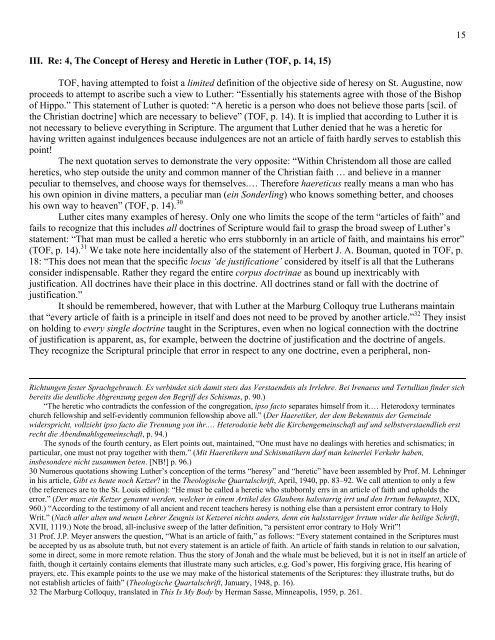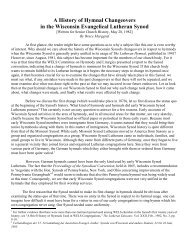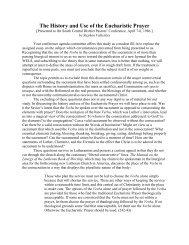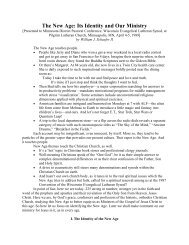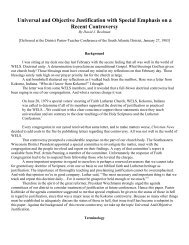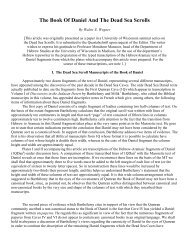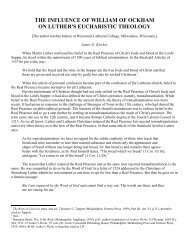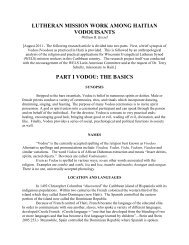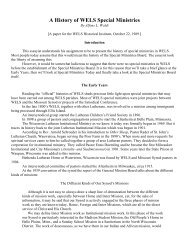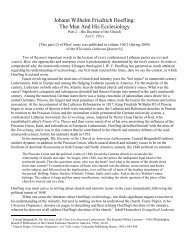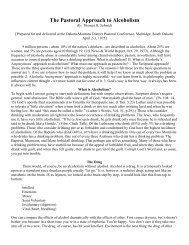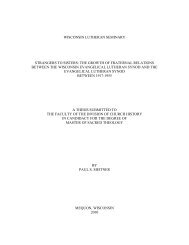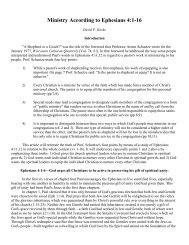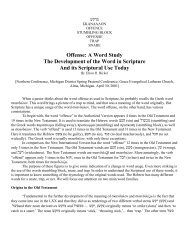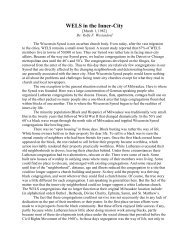What Is Heresy? - Wisconsin Lutheran Seminary Library: Essays
What Is Heresy? - Wisconsin Lutheran Seminary Library: Essays
What Is Heresy? - Wisconsin Lutheran Seminary Library: Essays
You also want an ePaper? Increase the reach of your titles
YUMPU automatically turns print PDFs into web optimized ePapers that Google loves.
15<br />
III. Re: 4, The Concept of <strong>Heresy</strong> and Heretic in Luther (TOF, p. 14, 15)<br />
TOF, having attempted to foist a limited definition of the objective side of heresy on St. Augustine, now<br />
proceeds to attempt to ascribe such a view to Luther: “Essentially his statements agree with those of the Bishop<br />
of Hippo.” This statement of Luther is quoted: “A heretic is a person who does not believe those parts [scil. of<br />
the Christian doctrine] which are necessary to believe” (TOF, p. 14). It is implied that according to Luther it is<br />
not necessary to believe everything in Scripture. The argument that Luther denied that he was a heretic for<br />
having written against indulgences because indulgences are not an article of faith hardly serves to establish this<br />
point!<br />
The next quotation serves to demonstrate the very opposite: “Within Christendom all those are called<br />
heretics, who step outside the unity and common manner of the Christian faith … and believe in a manner<br />
peculiar to themselves, and choose ways for themselves.… Therefore haereticus really means a man who has<br />
his own opinion in divine matters, a peculiar man (ein Sonderling) who knows something better, and chooses<br />
his own way to heaven” (TOF, p. 14). 30<br />
Luther cites many examples of heresy. Only one who limits the scope of the term “articles of faith” and<br />
fails to recognize that this includes all doctrines of Scripture would fail to grasp the broad sweep of Luther’s<br />
statement: “That man must be called a heretic who errs stubbornly in an article of faith, and maintains his error”<br />
(TOF, p. 14). 31 We take note here incidentally also of the statement of Herbert J. A. Bouman, quoted in TOF, p.<br />
18: “This does not mean that the specific locus ‘de justificatione’ considered by itself is all that the <strong>Lutheran</strong>s<br />
consider indispensable. Rather they regard the entire corpus doctrinae as bound up inextricably with<br />
justification. All doctrines have their place in this doctrine. All doctrines stand or fall with the doctrine of<br />
justification.”<br />
It should be remembered, however, that with Luther at the Marburg Colloquy true <strong>Lutheran</strong>s maintain<br />
that “every article of faith is a principle in itself and does not need to be proved by another article.” 32 They insist<br />
on holding to every single doctrine taught in the Scriptures, even when no logical connection with the doctrine<br />
of justification is apparent, as, for example, between the doctrine of justification and the doctrine of angels.<br />
They recognize the Scriptural principle that error in respect to any one doctrine, even a peripheral, non-<br />
Richtungen fester Sprachgebrauch. Es verbindet sich damit stets das Verstaendnis als Irrlehre. Bei Irenaeus und Tertullian finder sich<br />
bereits die deutliche Abgrenzung gegen den Begriff des Schismas, p. 90.)<br />
“The heretic who contradicts the confession of the congregation, ipso facto separates himself from it.… Heterodoxy terminates<br />
church fellowship and self-evidently communion fellowship above all.” (Der Haeretiker, der dem Bekenntnis der Gemeinde<br />
widerspricht, vollzieht ipso facto die Trennung yon ihr.… Heterodoxie hebt die Kirchengemeinschaft auf und selbstverstaendlieh erst<br />
recht die Abendmahlsgemeinschaft, p. 94.)<br />
The synods of the fourth century, as Elert points out, maintained, “One must have no dealings with heretics and schismatics; in<br />
particular, one must not pray together with them.” (Mit Haeretikern und Schismatikern darf man keinerlei Verkehr haben,<br />
insbesondere nicht zusammen beten. [NB!] p. 96.)<br />
30 Numerous quotations showing Luther’s conception of the terms “heresy” and “heretic” have been assembled by Prof. M. Lehninger<br />
in his article, Gibt es heute noch Ketzer? in the Theologische Quartalschrift, April, 1940, pp. 83–92. We call attention to only a few<br />
(the references are to the St. Louis edition): “He must be called a heretic who stubbornly errs in an article of faith and upholds the<br />
error.” (Der musz ein Ketzer genannt werden, welcher in einem Artikel des Glaubens halsstarrig irrt und den Irrtum behauptet, XIX,<br />
960.) “According to the testimony of all ancient and recent teachers heresy is nothing else than a persistent error contrary to Holy<br />
Writ.” (Nach aller alten und neuen Lehrer Zeugnis ist Ketzerei nichts anders, denn ein halsstarriger Irrtum wider die heilige Schrift,<br />
XVII, 1119.) Note the broad, all-inclusive sweep of the latter definition, “a persistent error contrary to Holy Writ”!<br />
31 Prof. J.P. Meyer answers the question, “<strong>What</strong> is an article of faith,” as follows: “Every statement contained in the Scriptures must<br />
be accepted by us as absolute truth, but not every statement is an article of faith. An article of faith stands in relation to our salvation,<br />
some in direct, some in more remote relation. Thus the story of Jonah and the whale must be believed, but it is not in itself an article of<br />
faith, though it certainly contains elements that illustrate many such articles, e.g. God’s power, His forgiving grace, His hearing of<br />
prayers, etc. This example points to the use we may make of the historical statements of the Scriptures: they illustrate truths, but do<br />
not establish articles of faith” (Theologische Quartalschrift, January, 1948, p. 16).<br />
32 The Marburg Colloquy, translated in This <strong>Is</strong> My Body by Herman Sasse, Minneapolis, 1959, p. 261.


